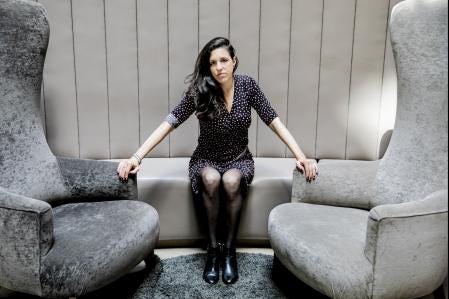The Camouflaged Children of Ariana Harwicz
The Hamas massacre and the psychological and social functions of hating living Jews while being mawkishly fascinated by long dead ones
Ariana Harwicz is a Jewish Argentine writer who has long resided in France. The article below appeared in a Buenos Aires media platform yesterday and I felt compelled to translate and share it. It gets to the heart of what’s been going on since October 7 better than any other text I have read.
……………………………………….
I was recently in Buenos Aires and was impressed by the fact that despite the presence of many police at the commemoration march for the AMIA massacre, I was not afraid. I also saw Jews in some neighbourhoods calmly walking around, and Orthodox families with their children playing in squares. In France that is not possible, I think that the Argentine Jewish community, and even the broader Latin American one, is perceived and self-perceived in a way that contrasts with the reality of Jews in the rest of the world, and that the ghost of the 30s about the power of the Jews is still present.
In France, the community lives concealing its Jewishness, lowering its profile, putting the mezuzot inside the house, the men wearing the kippah under a cap, lowering their voices in public places, regrouping in new neighbourhoods after having been cleansed from those where they had always lived. All in an attempt to "not look Jewish", in a historical continuity with the forced conversions.
Jewish children are in danger in public schools, especially if their Jewishness "shows" in their last names. History teachers alter their curricula, even not teaching the Holocaust, and are afraid of being attacked in class. Disguising identity, denying identity, and forcibly converting or assimilating to survive and not be lynched; quite paradoxical in times of identity and pro-diversity activism.
“But at least we are alive, we can’t complain”, I was told these days, nothing compared to the fate of Ilan Halim, Sarah Halimi or that of Mireille Knoll. At least my camouflaged children are alive, not like the three Jewish children murdered (murdered because they were Jewish) at the entrance of their school in Toulouse in 2012. As of today, there have been more than two hundred anti-Semitic attacks since October 7 in France alone, a symptom of an atmosphere of uncontrolled Judeophobia.
This is an impossible text to write and to publish, and yet, faithful to my obsession with the contradiction in writing, it must be written and published, because it is also impossible not to do so. Everything that happens at the discursive level today renews the collective hysteria of hatred of the Jew, crystallized in Israel, but it cannot be refuted with any historical argument, the anti-Jewish collective hysteria that shouts in the Place de la Repúblique in Paris, in London, in Sydney, in New York, and Barcelona, that is to say in the heart of genocidal Europe, the "let's rape the Jewish bitches, we are going to kill the Jews", cannot be dismantled with the genealogy of the facts, nor by showing how Hamas uses the money it receives from Europe, nor its instrumentalization of the Palestinians, nor the rejection of the Palestinians by the Arab countries, nor the blockade of Egypt, nor the call of Hamas to liquidate not only Jews but also Christians and non-believing Muslims.
Nor does it matter that they throw homosexuals from rooftops or that they hate women, in these times of activism for women and sexual minorities, another absurdity. All pedagogy is a failure: what can rationality do in the face of passion? Hating the Jew, as a figure, as catharsis, as psychic security in the face of anguish, is a passion that coheres and structures society, that brings people together, even if it sounds grotesque, one that unites the people.
When Macron called for national unity I was thinking that what unites them is hatred. A pogromist wave exists today in 2023, I think of my reading of the notebooks of Etty Hillesum, of Hélène Berr, and of Milena Jesenská, (a French publisher told me that they are translated and sell very well).
"The visit to the south chills the blood," writes Israeli journalist Gidon Levy in Haaretz. Dozens of children with their throats slit, residents of the Kibbutzim Kfar Aza and Be'eri burned alive in their homes, pregnant women with their bellies ripped open and babies torn out, children murdered in front of their parents, the international press authorized by the Army witnessed these scenes recounted by the Israeli daily Maariv on October 10, 2023.
On October 16, the charred, mutilated bodies were displayed at the Tel Aviv Legal Institute. "We decided to expose this horror because there are people who accuse us of lying and showing dog bones," the institute's director, Dr. Hen Kugel, told AFP. There he shows a tangle of bones and pieces of flesh held together by an electric cable whose sheath had melted.
What is shown is the murder of a genocidal nature against children and adults in the heart of Jewish national independence. What is shown in the Legal Institute is the return of a precarious existential condition ad aeternam of Jews who thought themselves safe with the founding of the State of Israel. To suggest a link with the settlements, the refugees and Jerusalem is to miss, willingly or not, the real political lesson of the tragedy.
Beyond surprise, there is a form of historical continuity in this sadism on the part of Hamas: the impossibility of accepting Jewish sovereignty over a land decreed Arab-Muslim for eternity. The impossibility of accepting the liberation of a subject whose status in the land of Islam was defined as that of a “dhimmi”, captured in this case in Article 31 of the Hamas charter: "In the shadow of Islam, the followers of the three religions, Islamic, Christian and Jewish, can coexist with security and confidence. Only in the shadow of Islam can security and trust be found, and recent and ancient history provides good testimony of this." Those who see in Hamas the expression of an anti-colonial struggle should ask themselves about a worldview that only conceives of otherness "in the shadow of Islam," to use their terms.
In 1980, in response to the bombing of the synagogue on Copernic Street in Paris, Prime Minister Raymond Barre said, "This heinous crime was intended to attack Israelis on their way to the synagogue, but it killed innocent French people crossing the street". No different to what was said after the AMIA bombing, "Jews and innocents died". These are details of the Nazified language, details of a captured language, even if they were a slip of the tongue, or precisely because of that.
These linguistic artefacts share the same semantic field in the pro-Hamas marches as in the Hitlerian fervour, in the rhetorical design of Goebbels as recorded by Klemperer, and in that of the Muslim Brotherhood. Jews dogs, Jews parasites, Jews guilty of killing, Jews guilty of dying, Jews guilty for being victims, or for being strong, Jews kneeling in the ghetto, or Jews with IDF weapons. Collaboration is (…) is, as many do, to say "Yes, but", which is to accept extortion.
In bookshops, on the other hand, as a sort of counter-epic or a sign of a senile epoch, books about Bełżec, Sobibór, Treblinka, Auschwitz-Birkenau and Majdanek, books about deportation poetry, books by Isaac Bashevis Singer, Saul Bellow, Philip Roth, Cynthia Ozick, biopics about deported Jews, series about Orthodox communities are on the rise, are very well placed. There are long lines at museums for the voyeurism of Jews in striped pyjamas behind barbed wire or in the form of mountains of bones, along with an active disregard for the living Jew, for the survival of the Jew today.
Imre Kertész, winner of the Nobel Prize in 2002, was in Paris giving a lecture on "The Holocaust as culture" when a listener in the hall rebuked him by denying the existence of the gas chambers. The fantastic thing about denialism is its speed, as in streaming; it happens in front of survivors, now denying the beheading of babies, in front of beheaded babies.
The other day I passed by a nursing home and I was thinking about how many of them would have been collaborators of the Germans. Today we live with the collaborationists, some of them are nice and even call themselves humanists. Mélenchon’s "France Insoumise" party and in Argentina, Myriam Bregman, have refused to condemn the actions of Hamas, to call them terrorists, to see the arthrological dimension of the attack, not only against the Jews but against a model of civilization. It is the greatest perverse investment of these times that in order not to be cancelled, to lose followers, or to neglect one’s electoral clientele, human dignity must be renounced.





